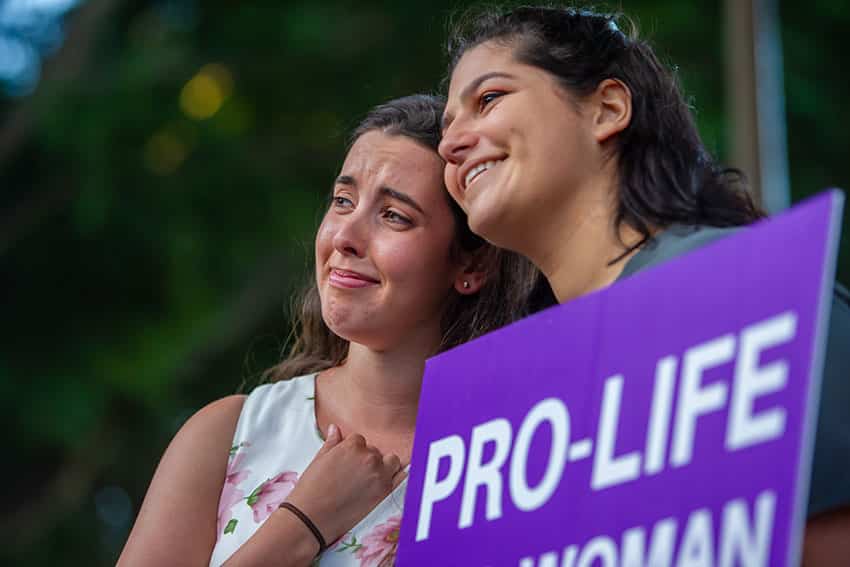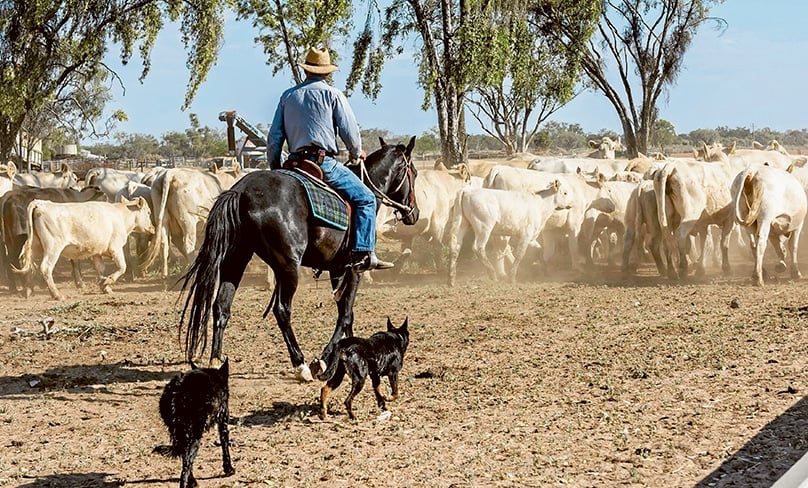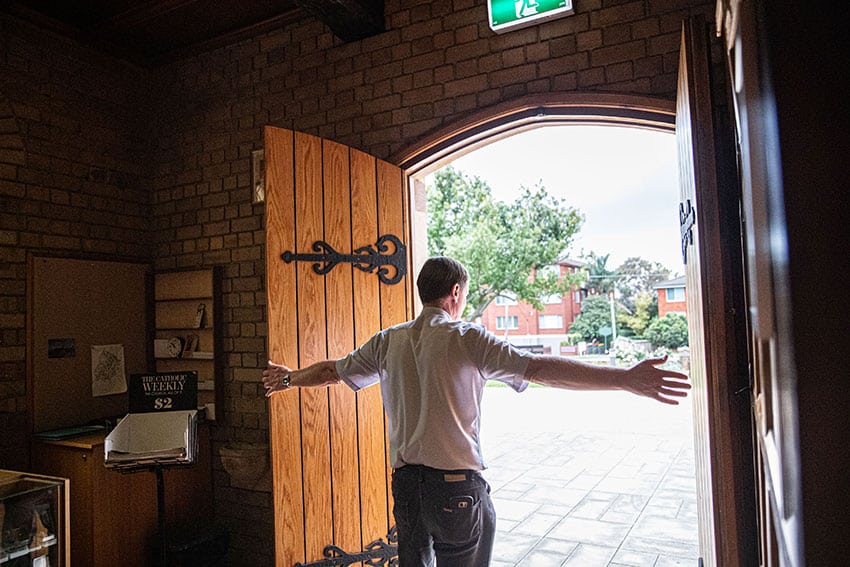
What society do we want to bequeath to our children and grandchildren in the years after the coronavirus pandemic?
The hell and betrayal of one which kills its weakest and exports the jobs of expendable workers to feather the nests of its elite’s pleasures?
A moral society with one eye on the truth and beauty of the divine, and the other searching for the same in the dignity and work of individuals and families?
Or, as is so often the case in Australia, an unsatisfactory muddle of the two – unhappily making the worst of the former live alongside half-hearted attempts at the best of the latter?
The society we had up to the end of 2019 is no longer an option, thanks to the twin health and economic crises caused by the COVID-19 coronavirus.
Not that it was much of a choice, given the extremes of society’s discontent and fragmentation along income, debt, racial, environmental and educational lines are a direct result of the social, economic and technological choices we have made continuously between the late 1960s and 2010s.
Born of the hubris that followed the successful post-World War II reconstruction and economic boom, these choices were based on the assumption that as long as anyone felt that their actions did not harm others, they should be free to do as they liked.
But if their choices did cause harm it was not their responsibility to fix, but the government’s.
This radically individualist approach has shaped both sides of Australian politics for the last five decades.

On the right, increasingly radical neoliberals maintained an alliance with traditionalist conservatives by paying lip service to the importance of families and religious freedom with little sincerity and action.
On the left, social democrats with genuine concerns for blue collar and middle-income white collar workers were bought-off by similarly radical neoliberals who masked their ambition with the blustery combination of progressive double-speak and the boorish rhetoric of militant trade unionists.
And lurking in the background on each side, a not insignificant number of their members with an unhealthy disdain for the democratic process and the rights and responsibilities that are necessary for its longevity.
Uneasy as these left and right coalitions are, they have held for decades. Going on to exchange turns on the treasury benches, each coalition has inevitably advanced programs which have hollowed-out families, endangered the weak and undermined the economic prospects of the young, as well as mid- and low-skilled workers – all in the service of letting people have what they wanted when they wanted it, whether cheap imports, replacement spouses or immaculately-timed pregnancies.
This neat arrangement of directly-opposed left and right coalitions obscured the deeper reality that there are three – not two – philosophical forces which shape how our society sees, hears and thinks of itself, and ultimately how this finds expression in political action.
In his seminal 1973 speech Philosophies in Collision, Bob “BA” Santamaria identified the philosophical traditions competing to define Western Civilisation as Libertarianism, Marxism and Christianity.
Quoting the influential Economist magazine, Santamaria asserted that Libertarianism “universalises the revolution of individualism” ultimately leading to “the war of all against all.”
Of Marxism Santamaria stated “the Party is the Church; there is no separation between the Church and the State; the Party uses the military, the police, the concentration camp and the psychiatric ward, the economic, the propaganda and the educational powers of the State to impose its one monolithic philosophy on young and old alike.”
The Christian or religious philosophy, on the other hand, “recognises the sacredness of the human person and the almost complete insufficiency of the isolated individual human being, unless he is clothed in a network of social relationships.”

For the religious philosophy to thrive, the economic order – “wages, ownership, taxes” – needs to favour its primary social manifestation, the family.
As the last five decades has demonstrated however, Australian policy-makers have championed Libertarianism through a socio-economic program which traded-in the economic security and stability of families and workers for oligopoly-friendly deregulatory industrial relations and free trade policies, as well as intensely radical social and family policies.
While Australia’s economy has grown, more of its families are broken with 50,000 divorces occurring every year.
The young who escape the of 65,000–80,000 abortions that occur in Australia annually find it harder to build meaningful relationships in this uneven mosaic of unstable and impermanent relationships.
They also find it harder to find meaningful work when the combined rate of unemployment and underemployment is 17 per cent and the first rungs on their career ladders are constantly being relocated overseas.
The aged fear isolation and the steady creep of euthanasia.
And all are drifting from the belief that something better lies beyond, which steels them to make the sacrifices necessary to live meaningful, if imperfect, lives.
Add to this mix the unrelenting advance of divisive identity politics and we are edging closer to “the war of all against all.”
Defining what our society will look like post-coronavirus is not a binary choice between ‘left’ and ‘right,’ but the philosophies and policies they offer. So, which to choose?

The interests which have benefited from the last five decades clearly want their party to continue.
The big banks, financial services and telecommunications firms make no secret of their intention to continue burning jobs as the cost of aggressively pursuing their ‘digital transformations.’
Profits derived from putting more technology and fewer people in-between shareholders and their businesses’ customers matter more than the ultimate social, mental and economic wellbeing of those same customers and society more broadly. Retailers profiting from selling imports over local manufactures want no change.
Neither does the legion of family, class action and personal injury lawyers benefiting from the misery of broken families, lives and bodies.
Most inert of all are the politicians who serve these interests.
The policy Libertarianism that Liberal, Labor and Nationals members have advanced sees progress as only moving in one direction, meaning more cheap imports, lost jobs, identity politics and fragmented families. Egging them on are Marxists looking to cement a coalition with them.
The success of the Greens in nudging Labor to a more Marxist posture while converting voters in traditionally Liberal electorates demonstrates that a Libertarian-Marxist alliance of the Labor and Greens parties, supported by “useful idiot” Liberals who cross the floor for key votes cannot be discounted.
Their Australia would be meaner, poorer and more godless than today’s.
On the other hand, an Australia defined again by Christian philosophy would not only be in a position to reclaim the ‘fair go’ ethos of the first seven decades of Federation but overcome that era’s willful blindness of Indigenous Australians, unfair limitations on women, and suspicions of foreigners and immigrants, all of which clearly fell short of Christian standards of justice and charity.

While inevitably imperfect in its implementation, it would at least put the need for sacrifice, solidarity and trust at the core of the social compact.
In other words, a genuine sense of “we’re all in this together,” whether as families, workers, businesses of all sizes, and government working towards the Common Good.
And what would the Common Good look like? It would favour the social and economic security of families and workers.
It would aim for full employment of workers of all skill levels under just working conditions, while fairly treating small and medium businesses in their dealings with large, oligopolistic enterprises.
Just as importantly, it would enshrine the right for all to worship and live out their religious ethos in whatever form it takes.
None of the competing philosophies can dominate on their own, so bringing back a ‘fair go’ society would require convincing enough Libertarians to make common cause with the religiously-inspired to form a dominant coalition to overwhelm any opposing alliance.
But not too many Libertarians lest we end up 50 years from now back where we are today.
But bringing back a ‘fair go’ society depends not on waiting for our politicians but pushing them in the direction we want them to go.
This will be done by living strong family lives; nurturing our youngest and caring for our oldest; being good and fair employers; being unafraid to proclaim our beliefs while living their values; and most importantly to do all these things openly to demonstrate it offers a stronger, more cohesive and economically-sustainable model for society than the alternative.
It will be difficult for our social, business and political leaders to accept, but the sooner they do, the sooner it will guide their actions.
So which philosophy do you want to shape Australia?
Related Articles
Australians need a fairer economy, say bishops in 2017 Social Justice Statement
New integralists: uninformed politics that misrepresents the Church
This Catholic Life Podcast – Ep. 24: Politics Is Personal
